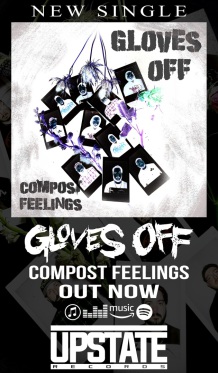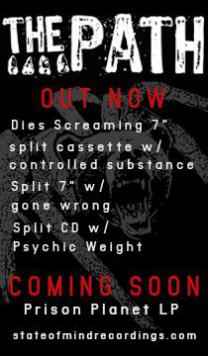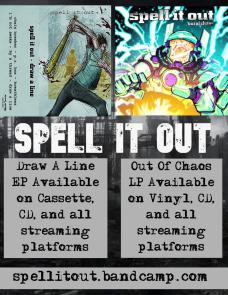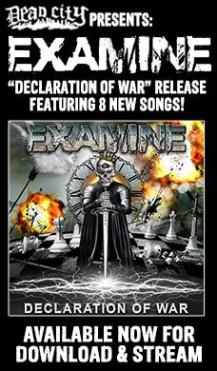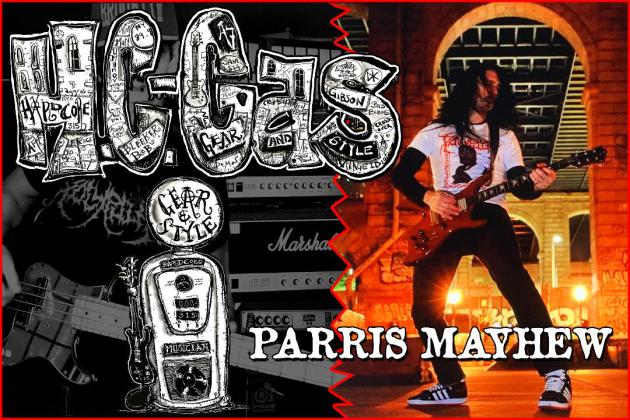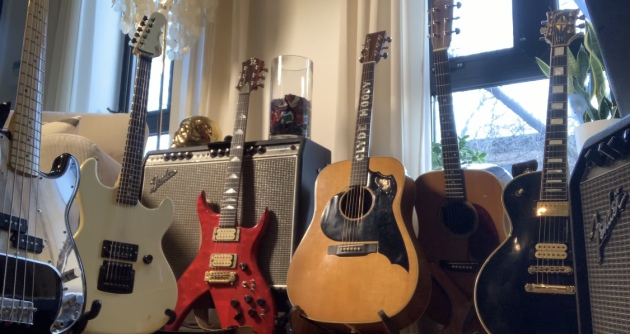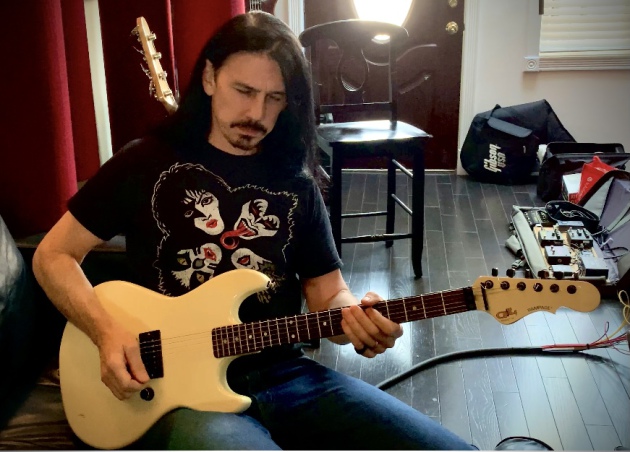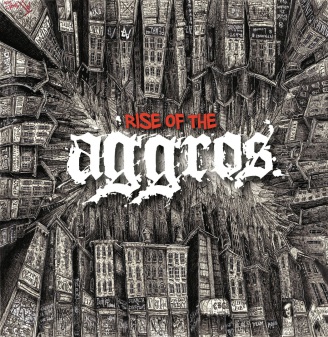Welcome to the first installment of “H.C. G.A.S.” which stands for “Hardcore Gear And Style”. My old friend Andrew Monserrate from the band Stand Proud (they were on the 1989 New Breed Cassette Compilation) recently got in touch with me telling me his idea how he wanted to see interviews with musicians from the hardcore punk scene where they talk more about their instruments, amps, strings, how songs come together etc. The feeling was that there are “big rock” magazines out there that do this very thing BUT not so much within the hardcore punk realm. Although geared towards musicians these interviews should produce enough stories to keep non-musicians satisfied as well. First up on our list is Parris Mayhew of Cro-Mags fame and now of Aggros who debuted “Rise Of The Aggros” earlier this year while also introducing Crumbsucker guitar great Chuck Lenihan into the fold as well. This interview is super long but jam packed with a ton of info and Cro-Mag backstories that we are happy Parris was able to share with us. We hope you check this out and enjoy this first installment! HC G.A.S. artwork by: Andrew Monserrate. Graphics by: John Franko.
IE: Let’s start from the beginning. When did you start playing guitar? Who or what influenced you to play guitar? Did you take lessons, or were you self-taught?
Parris: I had a false start, when I was 13 years old, and knew I wanted to play music but didn’t actually know what that meant or how to go about it so I asked my dad for a drum set. He got me an acoustic guitar. As a result I think my unformed brain rebelled against the consolation prize, and I ignored the instrument. But kept listening to music with an eye to playing, something. Geddy Lee and Chris Squire were the guys who really began to stand out to me and the acoustic guitar my dad gave me was boring me. It had a bird on the pick guard, I hated it, so I never played it. And in my ignorance I thought “bass must be easier because it has less strings” so when I was around 14 years old I asked my father for a bass and I took to it immediately. I didn’t know how to play anything so I began writing my own songs because writing music was my only way to play music. I didn’t take lessons or learn how to play the songs of bands I loved, and still don’t, and I never went through a cover band stage either. I started my first band REPORTED MISSING at age 14 with kids from my high school playing my original songs and trying our hardest to be like Rush. But then I heard Motorhead and I loved them just as much as the bands where only virtuosity reigned like Rush and Van Halen, bands who played Madison Square Garden and were in all the magazines, which initially, I had a hard time accepting. Motorhead completely warped my idea of what you had to be to make great music and with that in mind I began writing differently, more like myself. “World Peace” was the first of this batch of songs, so I played it for the band, but they didn’t understand it at all. That was part of the reason I broke up that band, I was changing but they still wanted to be Rush, all except our singer Paul Dordal. When he heard the song he declared, “this song will be called, World Peace Can’t Be Done.” Shortly afterwards Paul quit the band, and since he was my only ally in my new path I broke up the band and I began my mission to put together another band to play my new batch of heavier faster Motorhead inspired songs. That band became Cro-Mags.
IE: Can you chronicle your guitars from your first to what you’re using now?
Parris: My first bass was a Renaissance brand, it was a transparent plexi-glass instrument, it was the bass I played in Cro-Mags in the beginning, when we started I was the bass player, but we were not called Cro-Mags at that time. In the beginning of the band, we went through a laundry list of terrible names Harley Flanagan seemed to have an endless supply of, starting with our first name, “THE BALD EAGLES”. But back to the question, when I started the band I played bass, but eventually I switched to guitar. All the while we built our repertoire from my first batch of songs, all songs I wrote on that Renaissance bass. They were, “World Peace”, “Hard Times”, “Life Of My Own” and “Kill The Latola” which later became “It’s The Limit” once John Joseph joined the band and wrote with his own. As the band began to take on a new shape I needed a proper electric guitar. I loved Aerosmith, I still do and I had this picture of Joe Perry on the cover of Guitar Player magazine holding a red BC Rich Bich 10 string on my wall. So I got a similar one in 1981, but with only the normal six strings. The 1981 BC Rich Bich was the only guitar I owned for the entire duration of Cro-Mags and was the guitar I played on all three Cro-Mags records (the records people care about), it was the only electric guitar I ever owned until around 8 years ago when I was gifted a G and L Rampage, which is now my primary guitar. And soon after that I acquired a 1976 Gibson Les Paul Custom “Black Beauty” which is the last guitar I acquired. So I have three electric guitars, two acoustics a 1958 Martin D28 and a 1974 Martin D28 previously owned by country music legend and family friend Clyde Moody and has Clyde’s name in pearl on the neck. I also have a 1980 Fender P bass which I used to record most of the bass on “Rise Of The Aggros” and I acquired that one from Electric Mary Cambell.
"FAMILY PHOTO"
IE: “The Age of Quarrel” is continuously ranked in the top 10 if not the 5 best hardcore punk albums ever. I’ve read, you and the band wrote those songs when you were very young and in some cases in your mom’s kitchen. Can you key in on a couple of “The Age Of Quarrel” era tracks where you can specifically recall the writing process?
Parris: It’s usually ranked number one but who’s keeping track. The memory of discovering a riff is a powerful feeling and is always imprinted on your mind, the when, the where and the feeling of surprise at the ability to do so and keep doing so. So I remember writing all of them except a few that Harley Flanagan wrote. So I’ll address “World Peace” since that was the first Cro-Mags song and was a “Mom’s kitchen song”. I wrote it on my Renaissance bass when I was 15 years old. I wasn’t writing a ‘’hardcore song”. I don’t think I’d heard the word ‘’hardcore’’ used yet. I thought I was writing a “Motörhead type” song, doing my best to imitate Lemmy’s right hand. With Lemmy in mind I would rush home from school to play my bass and the riffs for “World Peace” flowed out of me and the song came together relatively quickly in a frenzy of inspiration. It was strange to have this new kind of song complete, that I did not have the week before. It made me feel different, my identity had changed. It was a mission moment. That song set me on a mission. In a young life the effect of making something good, can be a revelation and it was that for me. Enthusiastically, I showed it to my band but they didn’t get it. As a result I broke up the band and began my search to start a new band playing my new songs. Then I ran into my former singer Paul Dordal and I was surprised to see he was with Harley Flanagan from Stimulators, they saw me putting up musicians wanted flyers in front of 171 Avenue A. Paul introduced me to Harley (even though I knew who he was) and Harley asked about my flyer. I said, “I’m starting a band and looking for musicians.” Paul told Harley “I use to sing in a band with him, he’s a great bass player, he can play like Rush, you should play with him”. Harley wanted to hear me play, so we arranged to meet at his Aunt Denise’s apartment on 11th Street the next day. I knew “World Peace” was the best song I had so it was the song I showed Harley and needless to say, he loved the song and we decided to start a band, the three of us, me Paul and Harley. Harley said, we would be called “THE BALD EAGLES”. I didn’t realize I had written a song that would change people’s lives, and no I didn’t understand that it would be the model for an influential sound. It was just a song I wrote and it was what I wanted to play in a band, my band! That was how Cro-Mags began.
I also wrote “Malfunction” in my mother’s kitchen but I wrote it on an acoustic guitar… my 1958 Martin D28. “Malfunction” was a simple flow of riffs that all fit like a glove, easily and perfectly, it’s only three parts, and was completed in my mom’s kitchen while watching TV. Of course I wrote it sans John Joseph’s simple yet perfect lyrics. “Malfunction” is one of a few songs JJ and I wrote completely including “It’s The Limit” and “Show You No Mercy”. But back to the instruments these songs were written on, and about how it should not be a surprise that “Malfunction” was written on an acoustic guitar. If a song doesn’t sound good on an acoustic guitar, it probably isn’t any good.
IE: Around the time you were writing the songs for the demo was there a feeling within the Cro-Mags that you were creating something special that would still be held at legendary status decades later?
Parris: That question sounds nice. It must stem from a normal mind who imagines we were united by recognizing the lightning in a bottle we had hit upon, that we would be proud of it, band brotherhood and all, and we would look to each other with appreciation for our individual contributions? Nahhh no such luck. We were on the launch pad and we knew it, but instead of looking to each other with gratitude and bracing ourselves for the blast off, Harley and JJ were trying to push me off the launch pad. By the time the demo was done it was finally clear to me that all Harley cared about was how these songs, my songs and this band, would elevate his personal fame. Harley let me know how much he appreciated my songs by telling anyone who would listen that he wrote them which was inexplicable to me. Mackie once said to me, “Man let it go, in five years who’s gonna give a fuck who wrote these stupid fucking songs anyway.” I said, “I will.” Hearing Mackie contextualize my songs as meaningless really clarified to me how he felt about the band. He was just along for the ride because he thought we would get over. And clearly so did Harley, it’s why he had finally abandoned all the other bands he was trying to form at the same time, to finally focus on the one that would be successful, the one that showed the most promise, the one playing my songs, and he was laying the groundwork for taking credit for it all.
To clarify why a question about a song would lead to an answer that seems to sidestep the query and take us down memory lane instead, it’s simple, they are inseparably connected. There are so many memories imprinted on the songs I wrote, that became Cro-Mags songs, and the instruments they were written on. All the joyous moments of discovery, remembering every riff I wrote on them and the empowerment that they brought me, and then what followed, the gas lighting and disappointment that came when my bandmate tried to disconnect me from my own music. Those memories come back in a daisy chain of chronological events, that all stem from the guitars and leads down a road of memory that spans years because those songs became part of what shaped my early life. That’s why I always say, “GUITARS ARE FOR LIFE’’ because they are repositories for those memories, good and bad, revisited every time I play one my guitars. I hate that there is so much negativity attached to the music I made, I push back the bad and attempt to focus on the good. But since I left all that behind, I’ve created new songs on those instruments, new memories and a new musical life that eclipsed the past and it’s titled “Rise Of The Aggros”.
IE: The Cro-Mags demo and “The Age Of Quarrel” LP are very similar track wise except for the addition of "We Gotta Know" on the LP. Can you tell us about how “We Gotta Know” specifically came together and during the writing process did you know you were writing what would probably become the bands most recognizable song?
Parris: “We Gotta Know”, specifically the intro was what artist's call, “a happy accident”. The intro came to life by inadvertently borrowing from another song, “Malfunction” which shares the exact same chord progression. We were rehearsing, playing “Malfuction”, but during the first riff I realized my low E string was really out of tune. We were about to play the part where JJ sings, “I’m walkin’ and I’m talkin”, so I knew that part had chords I could let ring out and would afford me the opportunity to tune up while continuing to play, a little trick everyone uses to casually tune while in the middle of a song. So I hit the G chord into the F# , then held the F# and I quickly reached up and turned the tuning peg, I almost got it, but not quite, everyone was startled by the unexpected change in the song, and looked up at me. Harley could see what I was doing so he imitated my variation as he realized I was tuning. Then he and I hit those chords again together, so I could continue tuning. Mackie was surprised, and clearly confused and looked to us trying to get his bearings and as a knee jerk reaction to the chords I played Mackie joined in with big cymbal crashes, he probably thought he had made a mistake and was correcting it. Then we all rang out the resolving E chord as usual. While the E chord rang out I was successful in making the last turn of my tuning peg up to pitch. Mackie wasn’t always clear on how the songs went (we didn’t rehearse very much) and he usually just followed me so that’s what he did this time, but Mackie kept looking at me, he had this look on his face that said, “yeah man this is HARD!” I must say it did sound awesome. So in the spirit of this happy accident we started ringing out the chords even longer than before and the “Malfunction” chords were suddenly crushing in a completely new way. Harley took the opportunity to pretend he was guiding us and lifted his right hand and made a circle in the air which meant to keep going, as if we hadn’t already played it through a few times. We looped the intro a few more times and finally satisfied with the amount of time we played it, enough to know we were on to something great, we finally let the last resolving E chord ring out and we all began laughing about how great it sounded. Harley starting to act rooster chested as if HE had written this new thing, which worried me. By this time in the band I was weary of his claims of writing my riffs or taking credit for anything that happened in rehearsals. And most importantly those chords were already a song, MY SONG, “Malfunction”! My initial reaction was “Fuck, here we go again’’, I didn’t want “Malfunction” dissected to make a new song, so I said, “that’s already a song though, “Malfunction”, it’s the same exact part, played a little different, repurposed” but even as I made my argument I wasn’t convinced. Because, it did sound incredible, oddly enough, even though it was the exact same chords it was different enough, so, we ended up adding it to a new song that had been taking shape at the time and needed an intro, “We Gotta Know”.
That’s how a shadow of “Malfunction” became The Age of Quarrel’s iconic intro. The rest of the song is a mishmash of riffs Harley (verse) and I (chorus’ and bridge) put together, with lyrics by John Joseph. “We Gotta Know” is one of the only few true co-writes on the album, especially if you consider that we had one outside writer, wink. I’ll explain... a riff Harley brought in, the verse riff sounded exactly like a Bad Brains song, “I Against I”, so I said, “we can’t play that, it’s a Bad Brains riff.” The Brains had just broken up so Harley defiantly said, “So what, it’s a great riff and they broke up, so they don’t need it anymore!” I didn’t want to play it but as with all things Cro-Mags, by this stage of the Hare Krishna invasion, he would just enlist the others to take sides against me, or just act like an asshole until he got his way, so I gave in and hoped no one would notice the theft. You also have to consider, by this time, I had to pick my battles within the band and as much as stealing another band’s riff sucked, I had more important ground to hold. And oddly enough no one ever mentioned the similarity or straight up bite that that riff was of the Brains song. I guess people will hear the similarity now. I have always shied away from my claims on that song because of how I felt about stealing another band’s riff, which only left that song vulnerable for Harley to claim it all for himself but he deserves no more credit for “We Gotta Know” than me or maybe Darrel Jennifer deserves. But as far as the intro to “We Gotta Know” goes, the truth is, none of us wrote that intro or all three of us did, me, Mackie and Harley, depends on how you choose to look at it. All I know for sure is, I wrote the chord progression, when I wrote “Malfunction”. “We Gotta Know” was put together in a tumultuous time in the band, so it happened over time with a lot of bickering. On a brighter note, while we were assembling “We Gotta Know”, Mackie bought a double bass pedal and wanted to use it in Cro-Mags, which I was very happy about and wanted to manifest, so he and I met up at Westbeth Studios alone to figure out a way to incorporate the new pedal into the music. “Fast As A Shark” by Accept was the model I had in mind to imitate and a few Motörhead songs employed double bass so we spent an afternoon trying to imitate those references with little luck. The day did produce one song he successfully used double bass on and in a more original way than if he just mimicked the songs we were referencing, and that was on the choruses to “We Gotta Know”. Even today I consider it an elegant, and atypical solution for using double bass in a rock song. Harley now spins a yarn about how he wrote the entire song by himself, in the moment, instantaneously played the entire song, all the way through, beginning to end, by himself, fully arranged by instinct? Which is well, horseshit and sounds more like science fiction than his usual yarns.
IE: What was your main guitar during the early days of the Cro Mags? Amp? Strings, effects?
Parris: The only guitar I owned and used during the entire run of Cro-Mags was my 1981 BC Rich Bich. The amps I used on every Cro-Mags recording were JCM 800s 100 watt heads, always two heads for live performances, with 2 straight Marshall cabinets. I used a few pedals in that era, on “Age Of Quarrel” I used a BOSS Heavy Metal Pedal and on “Best Wishes” and “Revenge” I used a Ibanez TS10 Tube Screamer. Strings, I always used Super Slinky 9's.
IE: How did you and Doug Holland organize your sounds? What was the song writing process like?
Parris: Organize sounds? We didn’t do that. We did very little together. Doug was in the Hare Krishna camp, he was enlisted in the band by John and Harley really just to be another vote against me. He came in hostile and viewed me as an obstacle to him gaining position in the band, so we never had much of a relationship at all.
IE: Any advice to newer/younger bands with two guitarists?
Parris: I know your question is more of a practical question about the mechanics of two guitars, but the best advice I have for that is, write songs for one guitar, envy can be an insurmountable obstacle. But there are always exceptions to that rule, because now with Aggros, playing with Chuck Lenihan, two guitars is a pleasure. Do what I do, write for two guitars. For me writing for two means, harmony, and making sure each guitar has its own part to play instead of shadowing the other like we did in Cro-Mags. Listen to Aerosmith “Toys In The Attic” or “Rocks” and hear how two guitars should sound.
IE: Has your gear changed much from the Cro-Mag days, to what you’re using now in Aggros?
Parris: Vastly. My Bich died on the last Cro-Mags tour in 2000, too many years of being drenched in sweat. Then I quit the band and after the tour, the Bich went into storage, “un-repaired” and stayed there for a decade, during that time I didn’t play at all. Then unceremoniously, I was gifted a G & L Rampage from a band stalker of sorts but the G & L he gave me, despite its dubious origins became my main recording and performing guitar in Aggros. When I got the G & L, it was set up in D standard because the stalker was trying to sell it to Jerry Cantrell. So I left it in D standard, mostly because I didn’t intent to keep it. But ultimately I was won over by the guitar and its clean recording sound. Subsequently I set up all my guitars in D standard, even my acoustics. This tuning feels comfortable to me and I appreciated the thicker strings, so I switched all my guitars to 10’s with the D standard tuning.
I also changed my recording methods and philosophy. I spend less time in front of a wall of Marshalls and I do my playing at home with a small practice amp and I developed many of the songs at lower volumes and cleaner sounds… sounds I was unable to get with too much power in a recording environment. As a result I was willing to use whatever sounded good for a song. I used a little Fender practice amp to record “SK8bored Fight” and I used my 1976 Les Paul Custom. This combo couldn’t be more different than my wall of Marshall’s and my Bich. I did this with many songs on the “Rise Of The Aggros” record which is a poignant point. The sound, is in our hands, not in the gear. After I released the first version of “Chaos Magic”, I endlessly heard comments from fans saying, “Yeah man, this is the real Cro-Mags sound! It’s so obvious where the Cro-Mags sound came from! I love that BC Rich sound”. Which I appreciated greatly. But I recorded that song with the G & L Rampage and a Marshall JCM 2000 and JCM800. Point being, and I repeat, the sound is in our hands. My sound, would be my sound, despite the guitar or the gear. An important point to remember when looking for your own sound. Make whatever equipment or guitar you have work for you, and never believe that without the “proper gear” you can’t make great music.
PARRIS TRACKING FOR "RISE OF THE AGGROS" ON HIS G&L RAMPAGE
IE: You took a long hiatus from the music scene, what motivated you to pick up the guitar again? What was the longest time you didn’t play guitar? During that time off were you still playing? Writing?
Parris: I’m attracted by creative opportunity. I had an opportunity in the film business right after I walked away from Cro-Mags so I didn’t really think of it as a hiatus, I thought of it more as a lateral creative move. My creative life didn’t end after Cro-Mags, it mutated, I adapted to the opportunities. I’m an artist and that’s what I do. A lesson I learned from my dad, “You have to figure out a way to monetize your talents!” he said, and it became my model for life. There was a 10 year period when I didn’t play guitar at all. I had a tenor banjo in my apartment which I played and wrote on oddly enough. Melody is melody and two of the songs I wrote on the banjo during that guitar-less era will be Aggros songs eventually. I started playing again because my old pal Pete Asirisi (played drums on “Ghosts Of New York”) tricked me into jamming with him one afternoon and I never stopped. Then the pandemic happened and really gave me the time to finish “Chaos Magic”, which really lit the fire again. It was like writing “World Peace” all over again, it changed how I viewed myself, it empowered me, it made me a musician again.
IE: Aggros' first release is all instrumental… something very different from what’s been done before in hardcore. What’s the thinking behind that?
Parris: Never wait, move forward and use what you’ve got is always my philosophy. “Rise Of The Aggros” was the result of my normal creative process that starts with a clean slate. There wasn’t any thinking before the fact, people who claim that are vainglorious. I began playing, I wouldn’t even call it writing. I just play and play until songs reveal themselves to me during the course of the sheer pleasure of playing. Songs stem from attraction to sounds, chords, and melodies, that process, that discovery is the most fun I ever have playing music, writing is not a chore when you don’t have a deadline. I forged this batch of songs as a byproduct of my love for playing and when I was done, when the music felt complete I began recording and when a song felt finished, I stopped. A piece of music is complete when it’s satisfying for what it is. So I released the first song that felt complete “Chaos Magic”, then “City Kids”, and they were well received. People usually only like what they know, they are indoctrinated to do so, so on the surface, not having vocals might have implied in definition that, “something is missing” that expectation is normal. But that didn’t happen with “Chaos Magic” or “City Kids” so I kept writing with this model in mind until I had an album. It was a very natural progression. But as you said, it is an anomaly in hardcore music, so I am happy it’s been so well received, surpassing my hopes.
IE: Can you envision Aggros having a lead vocalist one day?
Parris: Considering a possibility without the reality of actual options, shouldn’t stop progress. I have only ever met a handful of great singers in my life, Layne, Lemmy, Jimmy G, Cornel, HR, and Phil Anselmo to name the most prominent but I have not met one of this caliber who was not already established. So how can I plan around a hope? I don’t.
IE: I’ve seen on social media that you have an amazing Martin acoustic… where did you get it? How do acoustic guitars fit into your writing/jamming process?
Parris: I have two Martin D28s. The first one is a 1958 that I have had all my life. My dad bought it as a “house guitar” which was played by house guests like Johnny Paycheck and others. My mother gave it to me when she saw music was a real force in my life. I wrote quite a lot on it. I wrote “Malfunction” on it. Many of the parts of “City Kids” were written on the Martin. The intro to “Chaos Magic” and the chorus of “Fear View Mirror”. The guitar speaks to me. I also have a 1974 D28 that belonged to a family friend and America’s first million selling recording artist Clyde Moody. If it doesn’t sound good on an acoustic, it probably isn’t good so I write and play my acoustics daily.
IE: At the first Aggros show you had a story about putting a piano in your living room. Can you share that story and tell us if that piano plays any role in creating music that would be used for Aggros material?
Parris: I had a Rhodes in storage for almost 20 years in hope that one day I would learn to play it. I never had a place to set it up until my wife and I bought a home in Brooklyn, where we set it up in the living room. The next day I was at work and I received a text from Barblin, “you have a piano lesson on Saturday at 2pm, you cannot have a piano in the living room and not know how to play it.” That Saturday Dierk Peters showed up. A German, classically trained piano teacher. So we began with Beatles songs and reading music which I grew tired of after six months. So I explained to Dierk that I had zero interest in playing Beatles songs or anyone else’s songs and how I learned guitar was by writing and practicing my own material and asked if this was a method he could adapt to. He thought it was an excellent idea. The first thing I showed him was something I wrote on the piano called “Haunted”. It’s the piano riff at the end of the song “City Kids” that Dierk later expounded upon on the record so elegantly. I showed him the initial chords and melody and he asked, “is that Thelonious Monk?” I said “no, I wrote it.” He said, “interesting chord choices for someone who doesn’t listen to jazz or play piano”. I initially wanted to play the outro myself, it would have been shorter and simpler but once I heard Dierk play the part and how he would expound on it by showing me, “what the chords you wrote imply” I had to have him play it. So we began transposing some of my other songs and he explained to me what I did as a composer. It inspired me and I played more. The more I heard the parts on piano, the more I realized the melodies were being accentuated by the clarity of the keys. So at the next lesson I played “City Kids” for Dierk. We examined the parts and he started by saying, “The parts have melodic implications, and you borrow chords from other keys to bend the ear. I noticed you do this a lot. We can push that and I will underline the implications.” After that lesson I said to Dierk, “what are you doing Saturday? I have a recording session and I’d like to explore having piano on one of my songs. What would I have to do to get you to play on it?” He said, “ask me” and that was the beginning. The album says the rest, piano is now a part of my music and will always be.
IE: If you had to pick out 1 disastrous gear nightmare that you had while playing live what would it be?
Parris: On the “Revenge” tour in 2000 during a particularly sweaty show my trusty lifelong BC Rich Bich was drenched in sweat and failed. Kaputt, it just would not respond, it was dead. Harley and I looked at each other with concern, but the show had to go on. Our second guitarist du jour Rob Buckley had a cheapo $300 Strat copy he brought out on tour for a backup so I grabbed that, plugged in and we continued the show and the tour. The other guitar player broke his hand a few days later and we finished the tour with Hector Hammett playing guitar. What I thought was a guitar disaster was just another hiccup, in a string of hiccups, before the band ended a few months later.
PARRIS & CHUCK LENIHAN WITH AGGROS @ ST. VITUS, BROOKLYN, NY JULY 5, 2023
PHOTO BY: DAVID GEISBRECHT
IE: How many new Aggros songs exist since “Rise Of The Aggros” was released and have any of them been co-written with Chuck Lenihan?
Parris: I have a bunch of new songs, I always have songs in various states of composition, we performed three of them on our recent tour, “Celulite Earthquake”, “One Free Miracle” and “Puzzle Of Broken Bones”. What Chuck brought to “Rise Of The Aggros” is icing on the cake. He is a mutant talent, his individual voice as a soloist is extraordinary and his solos on “ROTA” are inspired and unique and I hope for more of the same in the future. Chuck also brings a calm professionalism to the fold which I appreciate. He says, “yes” first when asked a question, then figures out a way to make it happen, knee jerk, “No’s” can be exhausting.
IE: What’s next for Aggros?
Parris: To support the debut album on tour or at shows locally. I’m looking for support spots for Aggros to get eyes and ears on the music, but until then we will do short regional headlining shows in the Tri-State area! And I will continue to write and record music and make companion music videos for every song, for the rest of my life, at my own pace, for those who are interested. What else is there?

